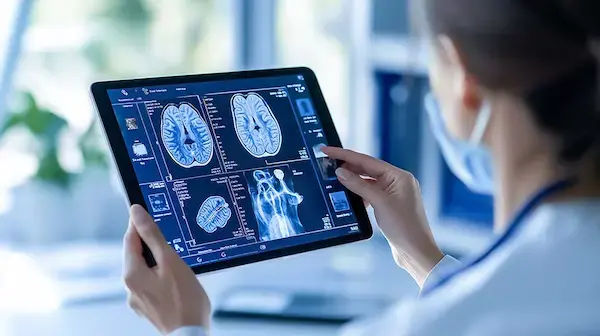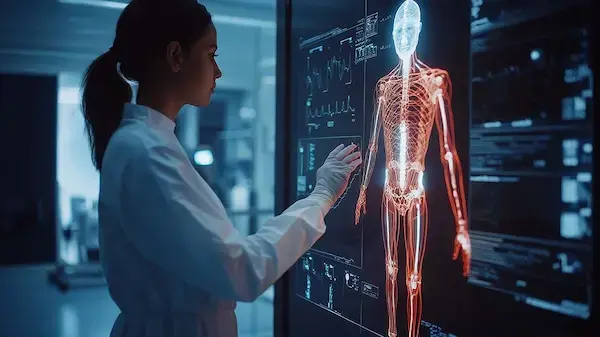Mamografías con IA identifican cánceres inicialmente negativos
Los análisis en centros médicos de primer nivel destacan la capacidad de la IA para ayudar a ...

Optimiza tu flujo de trabajo en clínicas, hospitales y centros radiológicos
Transforma tu operación con una plataforma 100 % personalizable.
.webp?width=500&height=500&name=Cronopost_Noviembre_Aquila+-14%20(2).webp)

Soluciones intuitivas y flexibles que revolucionan la gestión médica.
Descubre como la plataforma IMEXHS de almacenamiento seguro en la nube, visor universal y Business Intelligence ha sido diseñada para transformar la eficiencia clínica y administrativa.
.webp)
Aquila+ mejora significativamente la productividad clínica, la precisión diagnóstica y la experiencia del radiólogo, más allá de la lectura remota.

.webp)
Simplifica la gestión en los centros radiológicos y el diagnóstico en todos los niveles de complejidad.

Con algoritmos que contribuyen a interpretar los estudios de radiología de forma más exacta y en menor tiempo.
¿Vendes tecnología en salud? ¿Tienes experiencia comercial con clínicas, hospitales o centros de diagnóstico? Este programa es para ti.
.png)


.webp)
Más de 18 países y miles de especialistas han elegido nuestras soluciones para transformar la atención médica. Su confianza es nuestra motivación para seguir innovando.
.webp?width=154&height=78&name=cedicaf%20(1).webp)
.webp?width=155&height=78&name=clinica_san_pablo%20(1).webp)
.webp?width=154&height=78&name=auna%20(1).webp)
.webp?width=154&height=78&name=cediul%20(1).webp)
.webp?width=154&height=77&name=armada%20(1).webp)
.webp?width=154&height=77&name=centro_fertilidad_mujer%20(1).webp)
.webp?width=155&height=77&name=clinica_santa_maria%20(1).webp)
.webp?width=154&height=77&name=colsubsidio%20(1).webp)
.webp?width=154&height=77&name=corominas%20(1).webp)
.webp?width=154&height=78&name=hospital_cemesa%20(1).webp)
.webp?width=154&height=78&name=hospital_valles%20(1).webp)
.webp?width=155&height=78&name=health_time%20(1).webp)
.webp?width=154&height=78&name=gables%20(1).webp)

.webp?width=154&height=78&name=medplus%20(1).webp)
.webp?width=154&height=78&name=misericordia%20(1).webp)
.webp?width=155&height=78&name=oncologos_occidente%20(1).webp)
.webp?width=154&height=78&name=radone%20(1).webp)
.webp?width=154&height=78&name=unid%20(1).webp)
Diseña una fuente de ingresos sostenible con nuestro modelo de diagnóstico médico, sin necesidad de grandes inversiones. Únete al Programa de Partners de IMEXHS como parte de una red innovadora que transforma la atención médica global.
En el blog de nuestro sitio web encontrarás información amplia, relevante y actualizada acerca de cada una de nuestras soluciones de software. Consulta las últimas noticias, artículos, documentación e información empresarial y videos.
Los análisis en centros médicos de primer nivel destacan la capacidad de la IA para ayudar a ...
En la radiología contemporánea, el radiodiagnóstico se apoya cada vez más en tecnologías avanzadas ...
La inteligencia artificial en radiología vive hoy una transformación profunda con el auge del ...
Más de 500 hospitales, clinicas y centros de diagnosticos en 18 países confían en nuestras soluciones de imágenes médicas.
Clientes de todo el mundo han optimizado su flujo de trabajo y mejorado la atención al paciente con nuestra tecnología de última generación.
.webp)
Para nosotros IMEXHS representa innovación, tecnología, y sobre todo nos permite ser muy eficientes y rápidos con todos nuestros pacientes y usuarios.
.webp)
En Latinoamérica la necesidad creciente de una solución radiológica que se pueda adaptar a las posibilidades que existen alrededor y además tener un PACS de gran calidad es sin duda lo que marca a IMEXHS como empresa.

“No es solo un sistema que funciona, es una plataforma que ordena el proceso, reduce fricciones y permite a la administración concentrarse en lo verdaderamente estratégico”.
Te ayudamos a identificar la solución adecuada para tu centro, clínica o red, con tecnología segura, escalable y lista para crecer contigo.